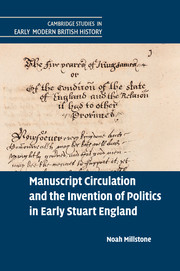Book contents
- Manuscript Circulation and the Invention of Politics in Early Stuart England
- Cambridge Studies in Early Modern British History
- Manuscript Circulation and the Invention of Politics in Early Stuart England
- Copyright page
- Dedication
- Contents
- Figures
- Book part
- Note on dates
- Glossary
- Chapter 1 Introduction
- Part I Conditions of production
- Part II Subjects and subjectivities
- Part III The secret history of the state
- Conclusion
- Select Bibliography
- Index
- References
Select Bibliography
Published online by Cambridge University Press: 05 May 2016
- Manuscript Circulation and the Invention of Politics in Early Stuart England
- Cambridge Studies in Early Modern British History
- Manuscript Circulation and the Invention of Politics in Early Stuart England
- Copyright page
- Dedication
- Contents
- Figures
- Book part
- Note on dates
- Glossary
- Chapter 1 Introduction
- Part I Conditions of production
- Part II Subjects and subjectivities
- Part III The secret history of the state
- Conclusion
- Select Bibliography
- Index
- References
- Type
- Chapter
- Information
- Publisher: Cambridge University PressPrint publication year: 2016



